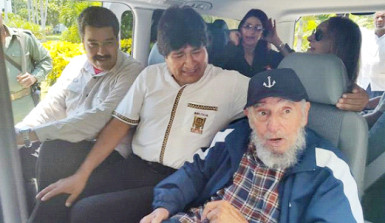HAVANA, (Reuters) – Retired Cuban President Fidel Castro celebrated his 89th birthday yesterday with two of his country’s closest leftist allies from Latin America, a day ahead of a historic visit by the U.S. secretary of state.

Castro, who handed power to his brother Raul in 2008 because of failing health, met with Venezuelan President Nicolas Maduro and Bolivian President Evo Morales, both staunch supporters of Havana’s Communist government.
Castro’s birthday fell on the eve of U.S. Secretary of State John Kerry’s trip to Havana. Kerry will preside over a ceremony to raise the U.S. flag at the recently restored U.S. embassy, the result of detente reached between Raul Castro and U.S. President Barack Obama last December. It will be the first visit by a U.S. secretary of state in 70 years.
Castro earlier marked his birthday with a newspaper column in which he castigated the United States for disrupting the world economy in its favor by abandoning the gold standard and mentioned one of the differences still outstanding between Havana and Washington despite the two countries’ rapprochement.
Castro repeated Cuba’s demand for reparations worth “many millions of dollars” from the United States for past aggressions against Cuba such the U.S. economic embargo imposed in 1962.
In pictures seen by Reuters, Castro was seated in a van alongside the two Latin American presidents, wearing a baseball cap, a track suit and a plaid shirt. It was not known where they went. Castro rarely travels outside his Havana home.
“I wish Bolivia all the love and admiration of the world,” Castro said in a poor-quality audio carried by Bolivian state radio. “Our island has remembered the children of the struggle, as you suffered.”
Castro no longer holds office in the government or Communist Party but holds sway in the public view with the honorific title Historic Leader and writes occasional newspaper columns. It is not known how much he discusses policy with his brother, who has embarked on a cautious program of economic reforms while vowing to preserve the political system.
After leading the Cuban Revolution of 1959, Fidel Castro drew Cuba into alliance with the Soviet Union, leading to decades of confrontation with the United States. Suffering from ill health, he stepped down provisionally in 2006 and definitively in 2008.





